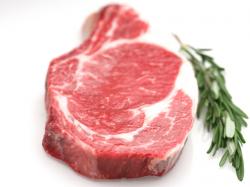What A Slab Of Steak Can Tell Us About Food Patent Law
June 25, 2012 | 2 min to read

A chef, a meat scientist, and an Oklahoma State food researcher walk into a beef summit in Chicago. It sounds like the setup to the world’s nerdiest gastronomy joke, but what actually happened one Tuesday this spring was that the trio unveiled their Vegas Strip Steak™, taken from an undisclosed part of the cow that has supposedly only ever been used for burgers, and proclaimed the cut of beef so earth-shatteringly original that they will be filing a patent for their knife strokes.
The news struck a nerve in the blogosphere, with responses ranging from ridicule to, in the case of Slate’s own Matthew Yglesias, bemusement. But the mocking responses don’t totally add up. People readily accept that industries like manufacturing or pharmaceuticals deserve legal protections for their inventions—so why do we get so uneasy when our taste buds are involved?
Patent law’s roots extend back to medieval times in England, and at its essence, it’s barely changed at all. The concept is to spur innovation by giving inventors the exclusive right to profit from their creations for a fixed amount of time (usually 20 years). Though the first patent on U.S. soil may have been for a method of making salt, Americans still tend to take issue with intellectual property being applied to food. Eating is such a basic, visceral human need that we switch into outrage mode when we hear about someone “owning” some aspect of our consumption. Food is something we share and value as social beings—how can a company possibly declare a monopoly on processed cheese or the act of putting a cucumber between two pieces of bread?
Claims like these are made every day. Last year the United States Patent and Trademark Office approved nearly 1,200 patents associated with Food or Edible Material—a drop in the bucket compared to the 247,000 total grants, but hardly small fry (though fries, incidentally, have been patented, too). Most are filed by large industrial producers and restaurant chains though there are also a handful of creative chefs who have patented everything from flavored forks to inkjet-printer sushi.
To read the rest of the story, please go to: Slate
